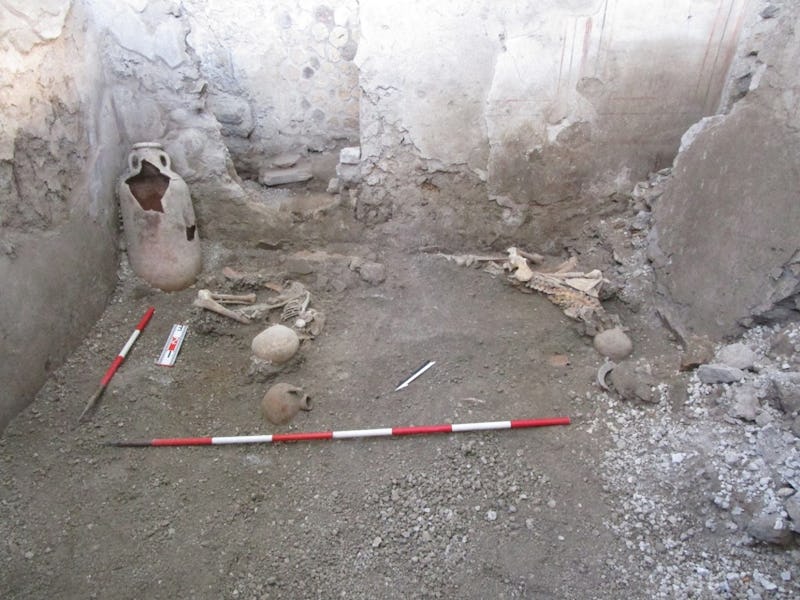Scientists Discover A Lost Truth About What Actually Happened At Pompeii
The destruction wasn’t just from an eruption.

In the summer of 79 CE, Mount Vesuvius blew sky high. The fatal blast smothered the estimated 2,000 inhabitants of Pompeii in ash. For centuries, the tale of Pompeii’s destruction was one of solely volcanic eruption. But that may not be the whole story. Recent findings in the heart of Pompeii paint a picture of even more catastrophe, one that may have permitted survivors — at least temporarily.
Volcanological, anthropological, and archaeological analysis, including two skeletons and one demolished building suggests that in addition to an eruption, Pompeii suffered a simultaneous earthquake, altering the narrative of volcanic destruction. Researchers from the Istituto Nazionale di Geofisica e Vulcanologia (INGV) and Pompeii Archaeological Park are the first to find evidence of this double whammy. Their paper, published today in the journal Frontiers in Earth Science, details the discovery.
“Our study provides an updated perspective of the destruction of Pompeii,” first author Domenico Sparice, a volcanologist at the INGV-Osservatorio Vesuviano, tells Inverse. These updates spell out even more carnage wrought by earthquakes in this apocalyptic scenario.
Found on top of lapilli rather than fully buried by it, this skeleton indicates a death by something other than ash.
The evidence comes from the central part of Pompeii, known as the Insula dei Casti Amanti (Insula of the Chaste Lovers), a block named for a fresco of two lovers kissing modestly. Within the Insula is the Casa dei Pittori al Lavoro (House of the Painters at Work), where Sparice and his team found remnants of destruction that were inconsistent with an eruption. The structural damage appeared more aligned with an earthquake. Two newly excavated, adjacent rooms in this house — as well as the remains they entomb — demonstrate that it wasn’t the eruption alone that wreaked havoc.
Discovered in mid-2023, two skeletons belonging to males around 50 years old depict the horrifying fate of surviving a volcanic eruption only to perish by earthquake. Rather than buried, these skeletons lay directly on top of the ash, also known as pumice lapilli. One skeleton rested on a few centimeters of pumice lapilli, covered by a collapsed wall. The other was blanketed by a mix of pumice lapilli and material from the adjacent walls. These findings suggest that these two weren’t suffocated by pumice lapilli, but rather crushed by debris. Curiously, ash outlined one skeleton in a circular shape, suggesting that he may have tried to hide under a wooden object for projection that has since rotted.
Based on the damage, Sparice and his team estimate this earthquake’s magnitude was 6 on the Richter Scale while its intensity was an 8 on the Mercalli Scale. An earthquake’s magnitude refers to its size while the intensity judges the amount of shaking.
This theory of a simultaneous eruption and earthquake, or syn-eruptive seismicity, isn’t new. “Past scholars have speculated that Pompeii possibly suffered the effects of the earthquake [that] occurred during the eruption, but no factual evidence has been reported so far,” Sparice says. “We found the evidence of such seismicity.”
This individual appears to have been killed by a fallen wall rather than volcanic ash, indicating the presence of a deadly earthquake.
Sparice’s vision of the tragedy begins with 18 hours of lapilli raining from the sky, forcing people to seek shelter. Accumulated lapilli killed some people through collapsed roofs. Once the eruption phase ended, Sparice says “violent earthquakes” occurred, destroying buildings and those inside. We have evidence of these earthquakes from Pliny the Younger, who described them in two letters to Roman historian Tacitus. At last, a wave of volcanic debris swept over the city and any survivors.
While these findings update our understanding of Pompeii’s destruction, we all know, of course, how the story ends. “All the choices made by Pompeiians during the eruption turned out to be deadly,” Sparice says.